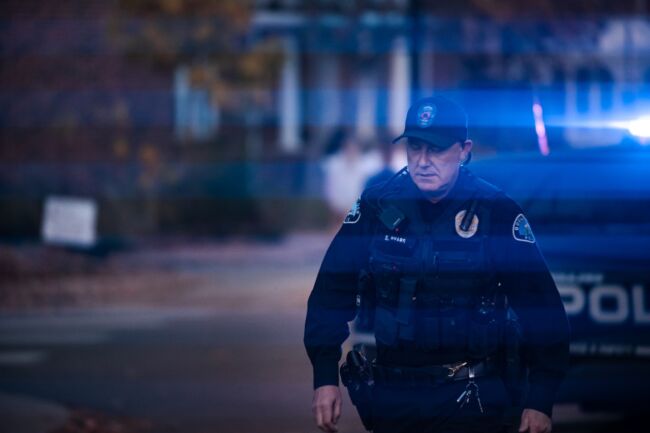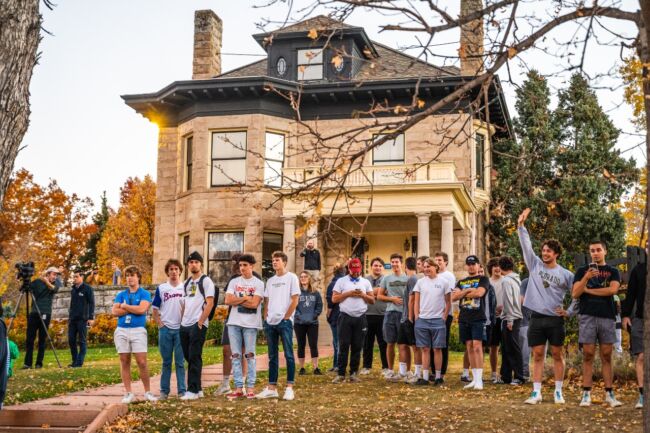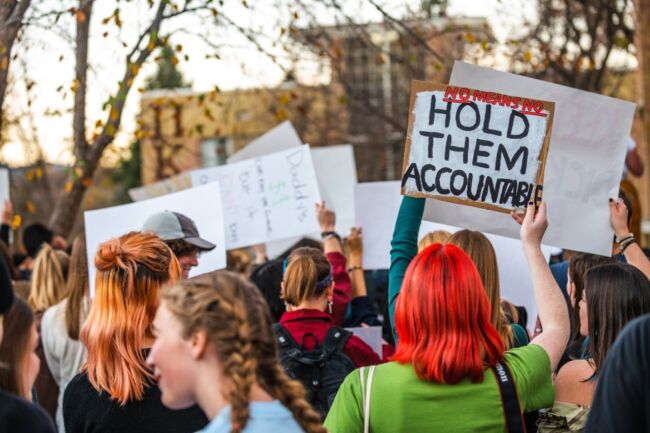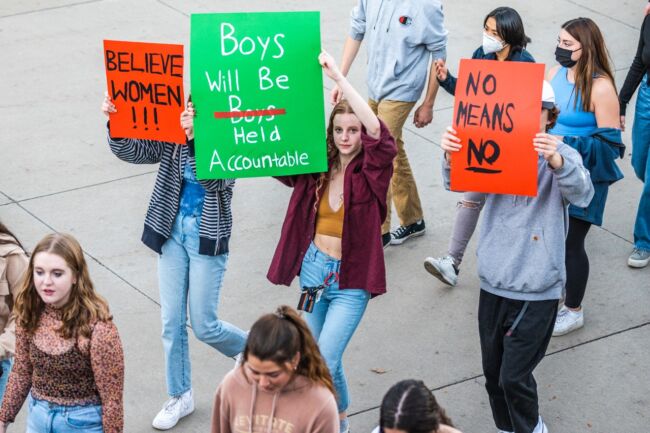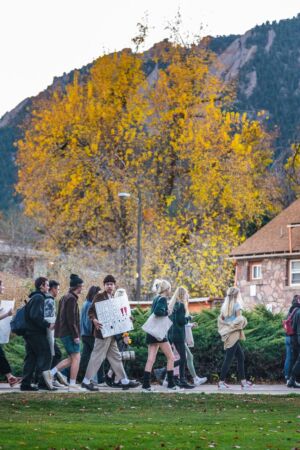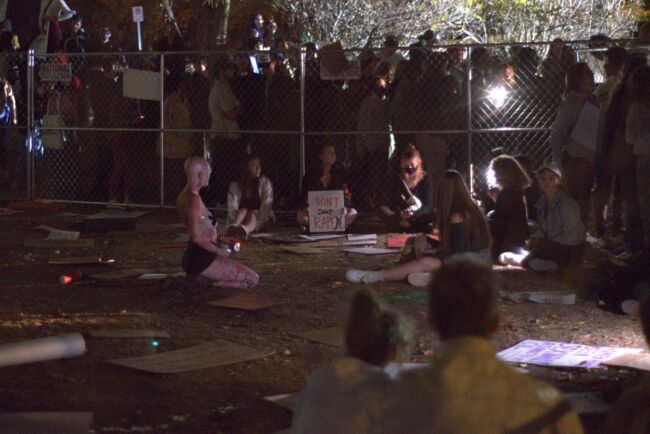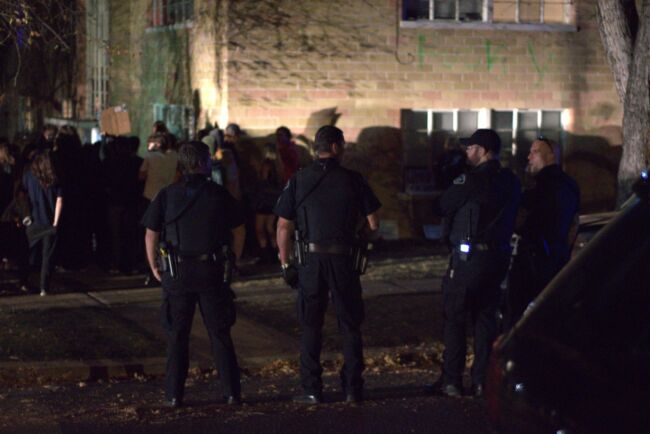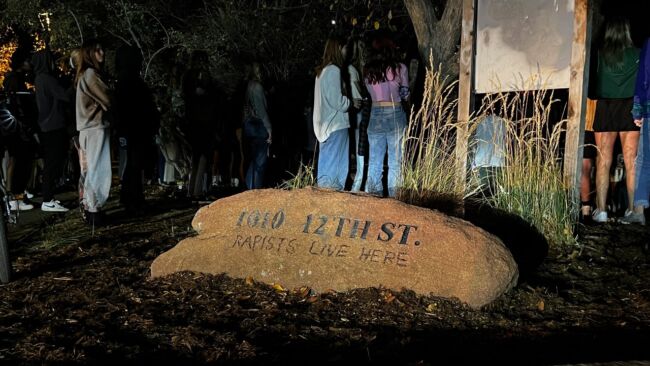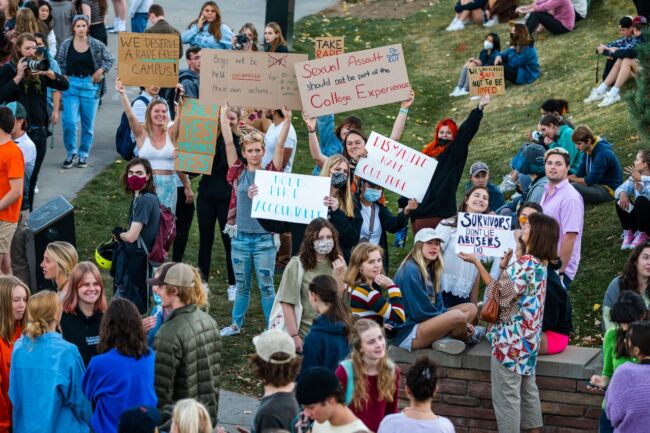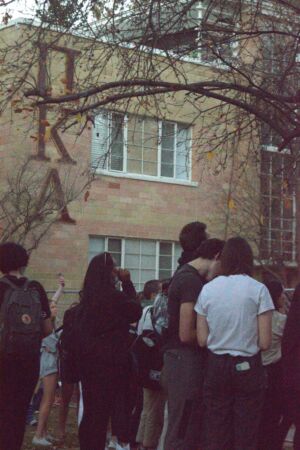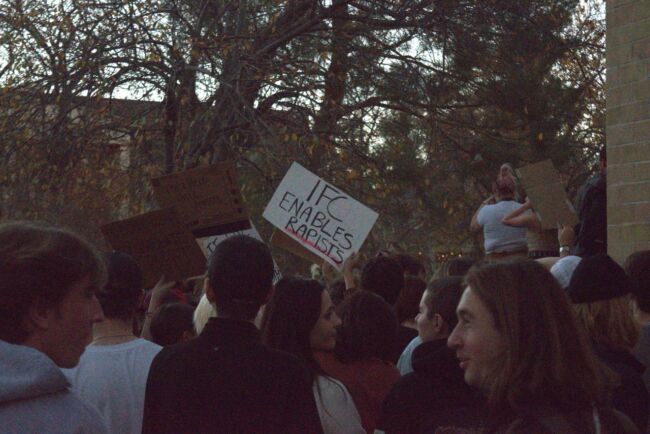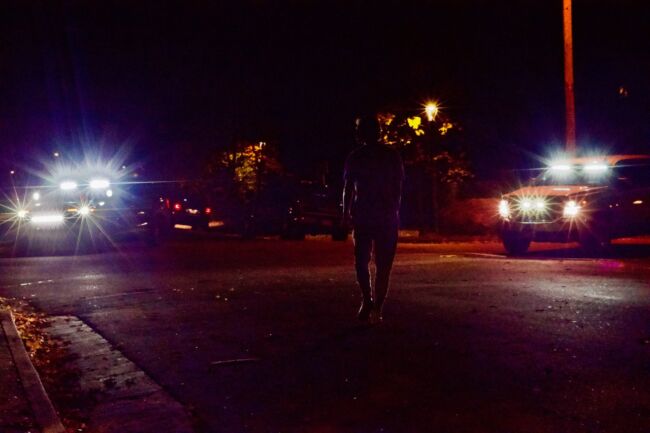From Bystanders to Bigots: how Societal Silence Led to On-campus Protest
The overwhelming risks femme-presenting individuals take just to be themselves.
TW:SA
This article has been updated to accurately reflect current reports. The Pi Kappa Alpha fraternity is alleged as the house where sexual assault was committed but not confirmed by local police.
An unfamiliar breeze accosts my legs as I gingerly step out of the car. Dim fluorescence from the flickering lights above paint the black asphalt a sickly yellow, interrupted only by my hatch-patterned silhouette. These 2 a.m. gas stops are nothing new to me, but something about this feels different. As I skulk around my car to its passenger-side fuel tank, I think about some of the late nights I have enjoyed in the past. Choosing to walk home to Brooklyn from my girlfriend’s apartment on the Upper West Side at 1 a.m.. The post-New Years subway ride at 4 a.m… Even walking back to Charles Village from Baltimore’s Inner Harbor past midnight.
All of these I did with wanton abandonment, confident that my masculine façade would shield me from the worst. And they did. But now, as my heels click rhythmically against the concrete and I pull my jean-jacket tighter around my corset to protect me from the brisk November wind, my fishnets and miniskirt lay bare my skin and soul in ways I had never imagined. There I was, a 5’10” man with a full beard and friends in the car right next to me, and I was afraid.
Whether trans, non-binary, cis, or anywhere in between, this fear and danger is the reality femme-presenting individuals face the instant they step out their doors.
On the weekends of Oct. 23 and 30, two separate accusations of sexual assault occurring at the Pi Kappa Alpha fraternity house, known as Pike, sparked campus-wide outrage at the University of Colorado Boulder. A protest was held on Nov. 5, drawing over 500 people who walked through campus to the frat house on University Hill, where a sit-in was staged. While local police have not confirmed the reports of the incidences happening at Pike, members of the community have named the location and walked to their house on Friday night.
Seated on the lawn in front of an institution that perpetuated rape culture, assigned female at birth (AFAB) individuals shared their stories with each other. At times they had to shout, competing with the police megaphone that whined remarks about trespassing. At times, it was so hushed that every breath a survivor took recalling the worst experience of their life rustled auburn leaves all around.
“If you see something, say something.” As a kid riding the subway in New York City post 9/11, this phrase has become embedded in my psyche for all time. Though meant for reporting “a suspicious package or activity on the platform or train,” it is generally a good motto for life. Bystanders play a significant role in perpetuating rape culture and sexual assault, and if you see something and do not say something, you are partially responsible.
Various universities, including CU, have begun requiring “Bystander Intervention Training” to decrease the number of people who watch and do nothing. These programs have shown at least slight success, as the number of bystander interventions has increased in the past decade.
Unfortunately, these numbers are still low. Various factors play into why some people choose to not intervene, like whether or not they know the victim, whether or not they know the perpetrator, their own gender identity, and the perceived ‘worthiness’ of the victim, often correlated with how revealing the victim’s attire was.
According to this study, men are less likely to intervene in all cases.
Photos of the Nov. 5 protest taken by Sasha Novack and Nathan Thompson
This gender bias was apparent at the protest. On the grassy lawn across the street, on the stoops of nearby buildings, even in the alleyway behind Pike, stood men. They watched protestors recount and relive their horrific experiences and offered no support. Some brought out beer and speakers, playing music over the protestors’ cries to be heard. These bystanders heard about the assaults and protests through Yik Yak and came to watch the show, saying things like “I’m just waiting for the first Molotov cocktail” and “There are definitely a lot of engineering guys there. Big beta energy.”
This behavior, coupled with misinformation, perpetuates rape culture and these bystanders are ignorant to the point of the protest. Though Pike is a large component of this protest, all Greek life and campus culture is on trial. Students are demanding that the campus becomes a safe space, no longer tolerating even a hint of predatory behavior from any individual or organization.
But how can these demands come to pass?
Initially, students are demanding harsher punishment for perpetrators, as well as either the restructuring or removal of Greek life from campus. Better systems need to be put in place to protect survivors as they go through the reporting process, and support needs to be offered to them after the process is complete. In the long term, students need to be taught at younger ages the necessity of consent. Lindsey Breslin, a Program Supervisor and social worker at Moving to End Sexual Assault (MESA), is working on doing all of the above.
MESA has partnered with CU Boulder’s Office of Victim Assistance (OVA), Office of Institutional Equity and Compliance (OIEC), and Moving Beyond Trauma to offer accompaniment for victims to forensic exams, ongoing victim advocacy, to provide ongoing treatment and therapy, and much more. MESA has been building curricula designed to teach safe sex and consent, including within LGBTQ+ relationships, that can be taught to students as young as 13.
These education programs hope to change how the next generation of college students treats each other, decreasing bystanders and perpetrators alike while allowing everyone to dress, act, and present themselves however they want.
The LGBTQ+ community is no stranger to violence. I could list statistics posted by the CDC on how our community experiences sexual violence at higher rates than the straight community and how transgender women in particular are targeted, but these are statistics most are all too familiar with. I could talk about how the media, public officials, and college campus offices have routinely victim-blamed survivors, citing their outward appearance or sexual identity and expression as flaws to be exploited, but victim blaming is nothing new and is done even at the highest levels of our federal government.
Instead, I will talk about why.
According to Breslin, the LGBTQ+ community faces violence because we challenge the norms. “Society ‘Others’ them. When society Others them, society dehumanize them.” The concept of “the Other” has been around in philosophy for centuries, originally coined by GWF Hegel in the late 18th century. It applies to anyone or anything you do not identify with, leading to a lack of empathy towards that individual or group. This is apparent between political parties, races, genders, and any other form of societal structure. Police ‘Other’ protestors the same way the US armed forces ‘Others’ terrorist organizations. Perpetrators of sexual assault ‘Other’ their victims, especially when their victim exists on the LGBTQ+ spectrum, dehumanizing the victim. MESA is addressing this concept of the Other in their educational programs, building towards empathy for all.
Of course, this is only one factor as to why the LGBTQ+ community is disproportionately targeted by sexual assault. Breslin also referenced the community’s innate distrust of the police force, making them less likely to report an assault. A perpetrator may see this as a ‘safer’ target. If a victim has yet to come out to their family or coworkers, a perpetrator may threaten to out them if they report. This form of blackmail can lead to an ongoing predatory relationship, as well as intimate partner violence and a “psychological force” preventing a victim from acting against the perpetrator.
Whether in broad daylight or at a dimly lit gas station, regardless of how one dresses, presents, or acts, no one should have to reach for the can of pepper spray around their neck to feel safe. CU Boulder, and society at large, has a responsibility to promote a healthy and safe learning environment for all students, and that is all the protestors were asking for: A chance to no longer be afraid.


